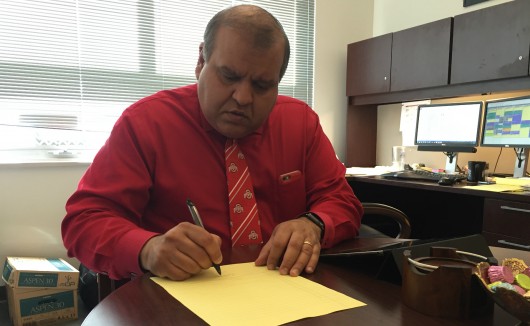
Dr. Micky Sharma, director of Counseling and Consultation Services, in his office at the Younkin Success Center. Credit: Ghezal Barghouty | For The Lantern
Stomach muscles tighten, the heart begins to pound and sleep becomes an illusion; the symptoms are inescapable for Blaire Teaford, a second-year in psychology who suffers from various levels of anxiety from day to day.
“For me, depending on the level, it could be just, I’m feeling very anxious, like my stomach hurts sort of thing,” Teaford said. “It could be debilitating, like I don’t want to get out of bed, I can’t go get food, I don’t have an appetite and I can’t do anything.”
Some students might consider stress just another part of the college experience, but too much can trigger anxiety and depression. Student stress levels are at an all-time high during exam weeks, and the Office of Student Life Counseling and Consultation Services at Ohio State, located in the Younkin Success Center, provides numerous resources for stress relief and therapy.
Dr. Micky Sharma, director of Counseling and Consultation Services, said anxiety is the most frequent issue for which students seek help at CCS, followed by depression and relationship difficulty.
All three of these issues are caused by stress, which for students is triggered by academic pressures, like exams, papers or projects, all on top of balancing social lives, Sharma said.
“Stress’ impact could be on your mood, like feeling anxious or feeling sad,” he said. “It could be sleep, appetite, changes in libido, concentration. It could be all of those things, and they can be connected.”
CCS provides students access to resources for stress relief and management, including individual counseling, which gives students one-on-one time with a therapist. There are also 33 counseling groups, ranging from eight to 10 students each, offered for those experiencing similar issues.
For Mike Wolowiecki, a second-year in marketing, one-on-one sessions were a major turning point for his self-esteem.
“It was always very calm and relaxing, and (the counselor) helped me work through a lot of self image problems I think I had,” said Wolowiecki. “It definitely helped, and I would tell anyone who is having a hard time to check it out. It was certainly worth my time.”
The office also holds daily drop-in workshops for students. Sessions can be found on the CCS website.
“Students don’t need to register, they don’t need to check in, they don’t need to show their ID,” Sharma said of drop-in sessions. “You just come, they go for an hour, you get some coping resources and you go on your way.”
CCS also holds workshops that cover topics ranging from overcoming anxiety and depression, to coping with perfectionism, and yoga for mental health.
Sharma said all students cope with a moderate amount of stress, which helps performance peak. It is vital for students to find this “sweet spot,” especially during finals, Sharma said.
“Everyone needs to figure out what level of stress they perform the best at,” Sharma said. “It’s about where their performance relates to their level of stress.”
If students are able to find the right level of stress, it will act as a motivator in academics, Sharma added, but when this stress gets too high, performance falls.
“Definitely whenever I’m anxious about school, I start forgetting things a lot, trying to remember everything, trying to be everywhere, everything starts slipping out of hand and I can’t concentrate,” Teaford said.
To combat stress on a day-to-day basis, students can benefit from healthy coping strategies like socializing, exercising and getting adequate amounts of sleep, Sharma said.
“Be proactive, know that there are going to be at high-stress points in the academic cycle, and what are you going to do to manage that,” Sharma said.
He said he recognized that each year there are added pressures for students to deal with.
“A good question to ask yourself at the beginning of any term or academic year: What is something different you are doing this year to take care of yourself that you didn’t do last year?” he said.


